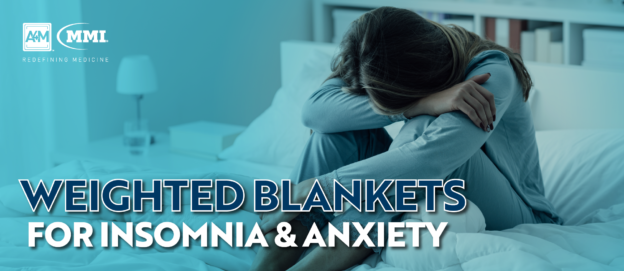In an era of continuous over-stimulation and high stress, a good night’s sleep is becoming increasingly hard to come by. More and more individuals are developing sleep apnea, chronic insomnia, and other sleep disorders, creating a “sleep market” — worth $28.6 billion in 2017 — focused on curing sleepless Americans. Over-the-counter and non-prescription drugs are on the rise, while sedatives such as Ambien and Lunesta remain as the most commonly prescribed drugs for insomnia.
As the side effects of sleep medications can be debilitating, insomniacs are increasingly turning to more natural solutions. A new, drug-free approach to targeting insomnia and other anxiety-related sleep disorders has been growing in popularity over the past two years. Weighted blankets, or gravity blankets, are being marketed as the latest solution for insomnia, nighttime anxiety, and stress. Filled with plastic beads or pellets, these blankets tend to range in weight from 3 to 20 pounds and are meant to mimic a comforting hug, lulling users to sleep naturally.
Sales of weighted blankets have surged in recent years, although there is little clinical evidence supporting their efficaciousness in treating insomnia.
Whether there are any health benefits to using weighted blankets remains a matter of debate, with some experts even cautioning against their use for children. However, weight therapy has a significant basis in medical practice. Commonly used as a calming strategy for children with autism or behavioral disturbances in psychiatric units, weight therapy relies on “deep touch pressure” which helps calm arousal levels in the nervous system by stimulating the release of serotonin and dopamine.
Weighted blankets attempt to mimic the calming effect of swaddling newborns, increasing feelings of comfort and security through pressure and envelopment of the body. BlanQuil, Gravity Blanket and other companies selling blankets recommend buying one that weighs 10% of your body weight to achieve the maximum soothing effect. Prices can range from $100 to upwards of $250 per blanket, making this potential new solution to insomnia costly despite little scientific backing.
Few reputable scientific studies have been conducted to evaluate whether weighted blankets can indeed cure sleeplessness and concrete evidence is lacking. Randomized clinical trials testing the efficacy of blankets would be difficult to achieve as a blind comparison is impossible; participants can immediately tell if a blanket is weighted or not.
A study funded by blanket manufacturers revealed calmer, higher quality sleep in 31 adults with moderate insomnia over a 2-week period. The most recent independent research was published in 2016 in the Journal of the Formosan Medical Association and did not examine the correlation between weighted blankets and sleep patterns. Instead, researchers evaluated nervous system activity in participants undergoing wisdom tooth extraction and found that people who wore a weighted blanket during the procedure showed higher activity levels in areas responsible for lowered stress response.
While there is no robust body of scientific evidence to support marketing claims that weighted blankets are a cure-all solution to nighttime anxiety and insomnia, there are few risks associated with trying them. Caution should be advised in individuals who suffer from sleep apnea, certain sleeping disorders, respiratory problems, and other chronic medical conditions as the use of weighted blankets could be detrimental for them. For most other healthy individuals, this new approach may provide a good alternative to sedative medications and their associated side effects. Regardless of sleep irregularities, proper sleep hygiene – which includes turning off electronics at night and keeping the bedroom environment conducive to sleep – is the essential first step in ensuring a good night’s rest.

